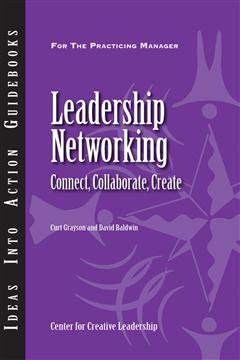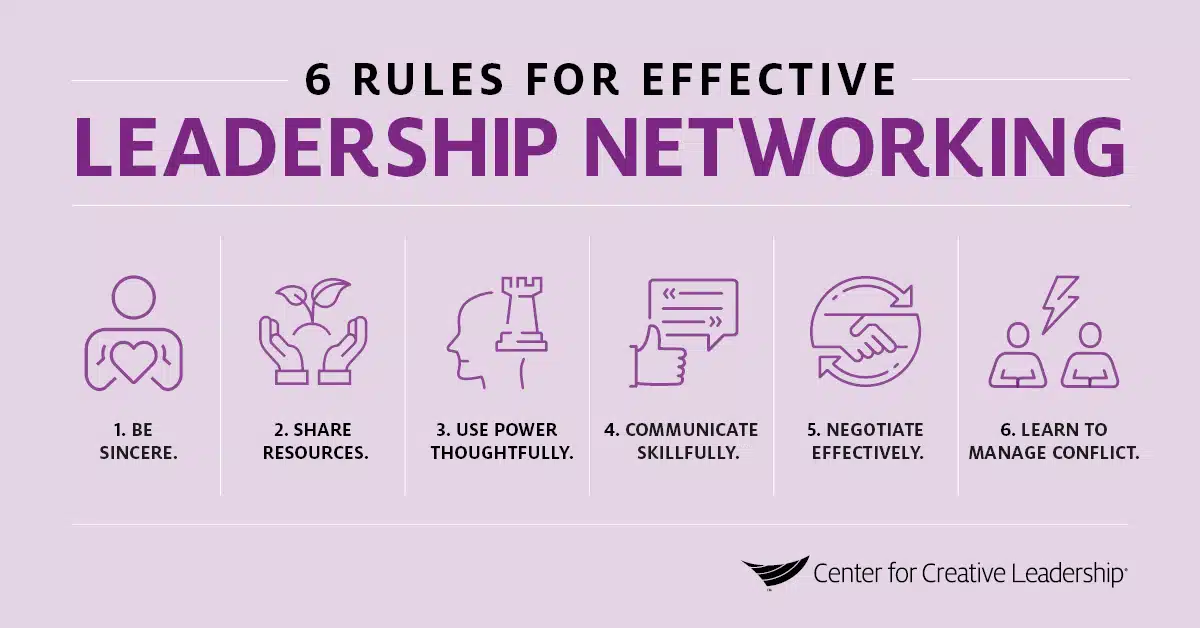If you’re rating the strength of your network by the number of friends you have on social media, it’s time for a lesson in leadership networking.
Leadership networking is about developing and using your networks in a way that builds relationships and strengthens alliances in service of your organization’s work and goals. The ability to influence others in informal ways rather than solely exercising your positional/hierarchical pow er is very important in today’s workplace.
Effective Leadership Networking
6 Leadership Networking Rules for Leaders
 As noted in our guidebook, Leadership Networking: Connect, Collaborate, Create, a robust leadership network helps provide access to people, information, and resources. It goes beyond knowing or linking to lots of different people. It’s about being able to use those connections wisely to solve problems and create opportunities.
As noted in our guidebook, Leadership Networking: Connect, Collaborate, Create, a robust leadership network helps provide access to people, information, and resources. It goes beyond knowing or linking to lots of different people. It’s about being able to use those connections wisely to solve problems and create opportunities.
The book outlines 6 helpful rules for effective leadership networking:
1. Be sincere.
Networking isn’t a ploy for getting your way. If you earn a reputation as someone who takes but doesn’t give, who uses information inappropriately, or who breaks confidences, your networks will shut down. Sincere, authentic leadership is important for a healthy and collaborative workplace.
2. Share resources.
Having resources such as information, services, and access will facilitate your leadership networking through give-and-take. Reciprocity is important. Become skilled at resource bartering, know your assets, and share them appropriately with others up, down, and across the organization. This is a key part of successfully collaborating across boundaries.
3. Use power thoughtfully.
Power is the ability to get things done. You’ll need 3 sources of power to build your network: your reputation, your alliances, and your position. Be the leader who gets results, can be held accountable, and has connections with key influencers or decision-makers. Understand the role of power in effective leadership and use it wisely.
4. Communicate skillfully.
Communication is so important for leaders. Communicate in a way that builds awareness of your needs and your assets. If you can’t make others aware of what you can offer and what you need in order to accomplish goals, your networking strategies will be ineffective.
5. Negotiate effectively.
Effective negotiators know when to push hard and when to back off, when to share information and when to hold back, when to swap resources, and when to trade short-term outcomes for a long-term goal. Avoid playing hardball, and avoid being viewed as a pushover.
6. Learn to manage conflict.
Learn skills for resolving conflict. When conflict occurs within your network, try to appreciate the opposing view. Look for points of mutual agreement. Express your position in a way that’s helpful to resolving the conflict.
A strong leadership network will serve you and your organization well, but it can also extend beyond the job. If you have a great reputation within your network, you have the advantage of having a solid group of contacts who can be resources if you start a job search or look to extend your professional reach.
How to Strengthen Your Leadership Networking Skills
In addition, the ability to understand your position in a network and the overall structure of the network impacts your leadership ability and the success of your team or organization. To boost your leadership networking skills, start with building a network perspective.
3 Questions to Ask to Help You Strengthen Your Leadership Networking Skills
To become a more effective influencer across your organization, think about strengthening and diversifying your network ties. Ask yourself 3 questions:
- Is my network open? Are the people I know all connected to one another? If more people in your network don’t know each other, you have a more open network, and you’ll likely gain access to more unique information.
- Is my network diverse? Do I have connections across different boundaries? If you have relationships with colleagues of different generations, including those above and below you in the org chart, and outside of your organization, you’ll gain access to more diverse information.
- Is my network deep? Do I go beyond surface interactions to invest in quality relationships? If you have meaningful connections with others who have your best interests in mind, you’ll be more able to trust the information you receive.
As you think about the characteristics of your network, consider the value of the ties and relationships you have — and the gaps or weaknesses that prevent you from accomplishing things that matter. With greater awareness, you can then begin to build a network that will help you achieve personal and organizational goals.
And if you don’t feel comfortable networking, particularly if you struggle with authentic networking, check out our networking tips to help.
Networks & Leadership: Different Levels, Different Needs
Your Leadership Networking Needs Depend on Your Leader Level
Keep in mind that the focus of your leadership networking will change over the course of your career. Typically, during a role transition or a career shift, leaders must modify their relationships to remain effective because at each level in the organization the relationship challenges and network needs are different. For example:
- First-time managers are learning to manage former peers and to build work relationships for the first time. Their network goal is to transition relationships.
- High-potential leaders are making a name for themselves and their work. Their network goal is to strengthen relationships.
- Managers of managers — those leading departments and divisions — are focused on executing strategy and managing resources. Their network goal is to create strategic relationships.
- Executives need to create strategy and manage public perception. Their network goal is to reverse insularity and isolation.
As you work on developing yourself, and as you’re steering your organization for the future, consider your own leadership networking. Do you have the right relationships and are you building the right networks to help you solve the challenges you face? Is a different combination of ties needed to access information and leverage your ideas? After you reflect on your leadership and networking skills, you can begin to make changes.
Ready to Take the Next Step?
Upskill leadership networking skills across your entire organization with a customized learning journey for your leaders using our research-backed modules. Available leadership topics include Authentic Leadership, Boundary Spanning, Communication, Conflict, Influence & Selling Your Ideas, and more.










